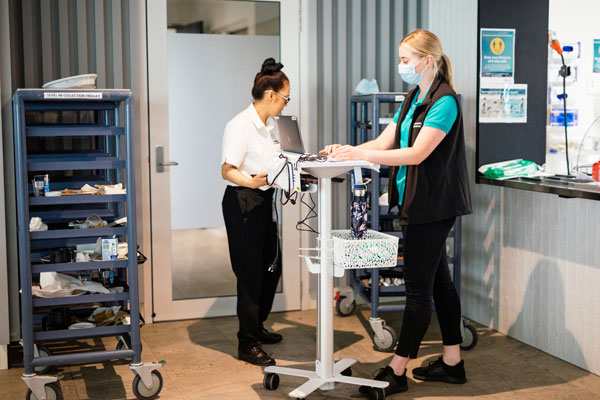 Dietetics and Food Services play a vital role in the recovery of patients during their hospital stay. While having nutritious food is key, catering for people’s individual tastes and preferences is also important.
Dietetics and Food Services play a vital role in the recovery of patients during their hospital stay. While having nutritious food is key, catering for people’s individual tastes and preferences is also important.
Jennifer Ellick, Director of Dietetics and Food Services at STARS, explains the STARS digital systems which manage food services support a patient centred experience.
“Patients can have their food delivered in two ways, room service and dining room service. Room service can be ordered from the patient engagement system (PES) at their bedside, in real time and on demand,” Jennifer said.
“The PES enables patients to order foods suitable for their stage of recovery and when they feel like eating. It is all about offering maximum flexibility and patient choice. They can order an all-day breakfast, or burgers, pizzas, toasted sandwiches, the kind of food people feel like eating after three days of fasting.”
To support rehabilitation and nutrition, longer-stay rehabilitation patients are encouraged to eat their meals in the purpose-built dining room, which has a wonderful green outlook over a landscaped courtyard.
 The dining room offers full table service, with patients being greeted by a maître d’ who asks where they’d like to sit and conducts a four-point ID check (name, date of birth, medical record number and food allergen status) to ensure the right food is delivered to the right patient.
The dining room offers full table service, with patients being greeted by a maître d’ who asks where they’d like to sit and conducts a four-point ID check (name, date of birth, medical record number and food allergen status) to ensure the right food is delivered to the right patient.
“Having patients attend the dining room for meals is a fantastic way to routinely get them up and moving. Getting up out of bed, getting dressed, making the trip to the dining room, and choosing their food, promotes a patient’s autonomy and mobility, as well as their nutrition,” Jennifer said.
Staff have recently implemented a ‘feedback galaxy’ where patients can write their dining room experience feedback on a paper star to display in the room. The feedback has been overwhelmingly positive.
“Love the atmosphere, socialising, fresh air, and music. Love it.”
“My first day in the dining room and I love it. It’s the first time I have been able to go outside or see the sun in over 5 weeks. It’s great.”
“I really enjoy eating at a real table. Feels much more like home.”
Whether a patient orders room service or eats in the dining room, the STARS menu management system tracks the nutritional intake of every patient’s meal.
The ability to record how much of the meal is consumed is a significant development as it allows patients who are not eating well to be identified, and strategies put in place to better support their ongoing nutrition.
“Proper nutrition is such a big part of a patient’s recovery, so easily identifying those who are not receiving adequate nutrition is crucial,” Jennifer said.
“Patients who are identified as eating less than 50% of their meals and snacks are visited by dietetic assistants who implement strategies to support increased intake. This could be putting them on a high protein and energy diet, offering and encouraging foods that contain more energy and protein, providing meal-time assistance or implementing nutrition supplements.”